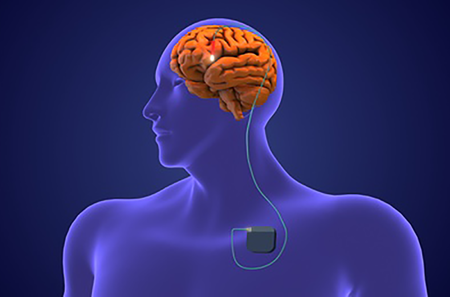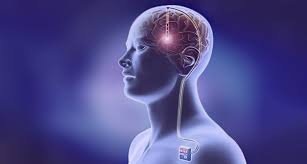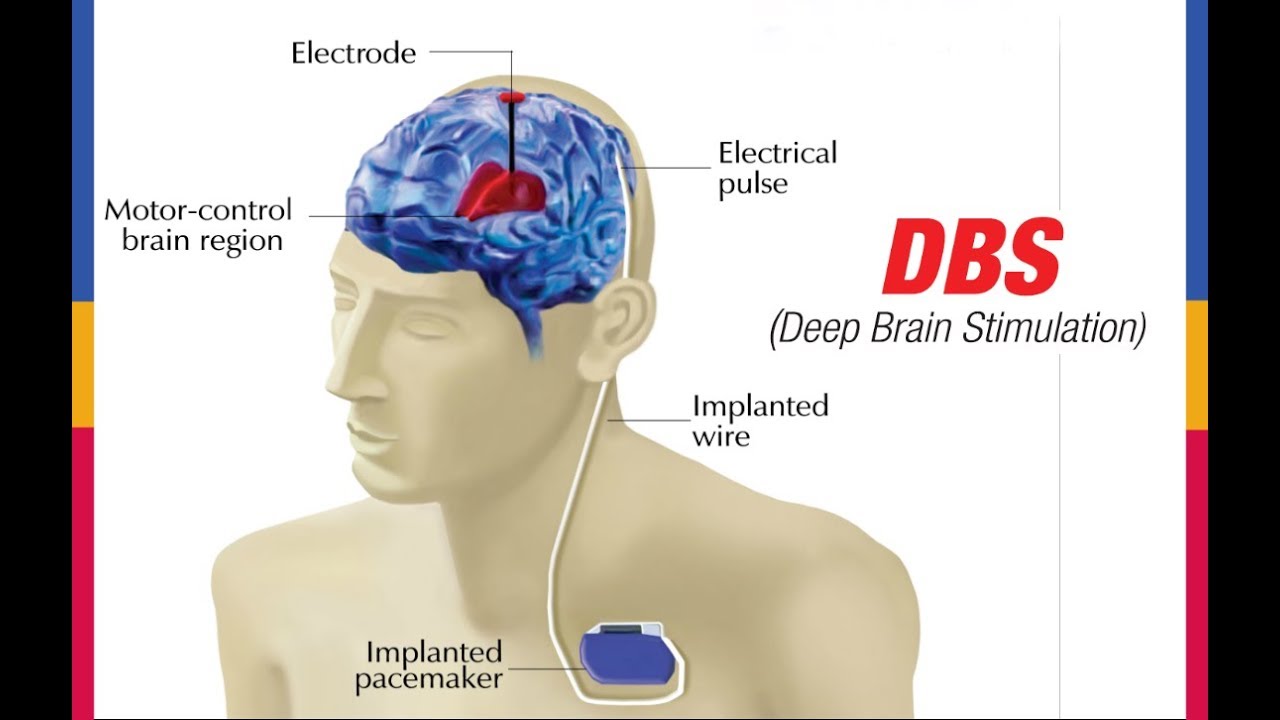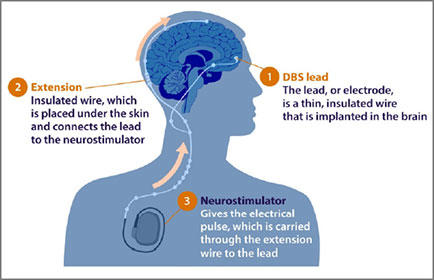Deep Brain Stimulation - Non-Rechargeable Implant
India
-
Our Price USD 14850
-
Hospital Price USD 16500
-
You Save : USD 1650
Booking Amount: USD 1485. Pay Remaining 90% at the hospital.
Book NowAdditional Credit
Among the important extras we offer as part of the Additional Credit are the following:
-
Site Tourism For The Patient & Attendant
-
Airport Pick & Drop Service
-
Ambulance service at airport
-
Priority appointments with The Doctor
-
Cancel Easily Anytime with Full Refund
-
Room Upgradation
-
Free Online Doctor Consultation Valued at USD 20
-
Free hotel Stay for 5 to 7 days Accordingly
-
Welcome Kit at Arrival
-
Interpreter
-
Medical Visa Assistance
What is Included?
- Doctor consultation charges
- Lab tests and diagnostic charges
- Room charges inside hospital during the procedure
- Surgeon Fee
- Cost of implant
- Nursing charges
- Hospital surgery suite charges
- Anesthesia charges
- Routine medicines and routine consumables (bandages, dressings etc.)
- Food and Beverages inside hospital stay for patient and one attendant.
What is not Included?
- Extra Radiology Investigations
- Healthcare Professionals Charges of other consultations.
- Other Requested Services such as Laundry etc.
- Additional Pharmaceutical Products and Medicines After Discharge from Hospital.
- Management of Conditions Unrelated to Procedures or Pre-Existing.
- The cost of any additional implants will be in addition to the package cost.
Package Description
Procedure Description:
Deep brain stimulation (DBS)
Deep brain stimulation (DBS) is a neurosurgery procedure that is used to treat movement disorders. Some of the movement disorders that can be treated with DBS are dystonia, essential tremors and obsessive compulsive disorder (OCD). In recent years, the procedure has been found to be very effective in treating OCD. Deep brain stimulator is a device that is placed in the brain to send signals to certain areas to help stop the symptoms of a movement disorder.
Disease Overview:
Parkinson's Disease:
Parkinson's disease is a degenerative neurological condition affecting the nervous system and the body's nerve-controlled regions. The onset of symptoms is gradual. A tremor in one hand that is hardly perceptible may be the initial symptom. Although tremors are prevalent, the disease can also make you stiff or move more slowly.
You may have little to no expression on your face in the early stages of Parkinson's disease. As you walk, your arms might not swing freely. You can start to speak more slowly or slurred. As your Parkinson's disease worsens over time, so do its symptoms.
Disease Sign and Symptoms:
Among the signs of Parkinson's are:
1- Tremor. Tremors, or rhythmic shaking, typically start in a limb, most frequently the hand or fingers. You might give your thumb and forefinger a quick rub. We call this tremor a pill-rolling tremor. When your hand is at rest, it could shake. While working on chores, you might experience less shaking.
3. Slow motion, sometimes called bradykinesia. Parkinson's disease may cause movement impairments over time, making even routine tasks more challenging and time-consuming. When you walk, your steps can get shorter. It could be challenging to get out of a chair... When you attempt to walk, your feet could drag or shuffle.
4- Firm muscles. You can have muscle stiffness anywhere in your body. Your range of motion may be restricted and unpleasant due to the stiff muscles.
5. Poor balance and posture. You might start to slouch. Or Parkinson's disease may cause you to stumble or lose your equilibrium.
6. Loss of reflex motion. Your capacity to make involuntary gestures, such as smiling, blinking, or waving your arms while walking, may have diminished.
7. Variations in speech. You can slur your words, speak slowly or rapidly, or hesitate to say anything. Your speech might not contain the typical speech patterns; instead, it might be more monotonous.
Composing modifications. Writing could get challenging and your writing could look cramped.
Disease Causes:
Although the exact causation of Parkinson's disease is unknown, a number of factors seem to be involved, such as:
1- DNA. Certain genetic alterations have been found to be responsible for Parkinson's disease. However, these are unusual, unless there are several family members who are afflicted with Parkinson's disease.
Though the risk of Parkinson's disease appears to be lower for each of these genetic indicators, some gene mutations do appear to enhance the risk of the condition.
2- environmental catalysts. Although the risk is low, exposure to specific toxins or environmental variables may raise the chance of developing Parkinson's disease in the future.
Researchers have also discovered that patients with Parkinson's disease have numerous different changes in their brains, however it's unclear why these changes take place.
Disease Diagnosis:
Parkinson's disease cannot yet be diagnosed using a particular test. A neurologist—a medical professional with expertise in disorders of the neurological system—makes the diagnosis. Your medical history, a review of your symptoms, and a neurological and physical examination are used to make the diagnosis of Parkinson's disease.
A dopamine transporter (DAT) scan is a particular type of single-photon emission computerized tomography (SPECT) scan that may be recommended by a member of your healthcare team. While this may provide credence to the idea that you have Parkinson's disease, the final word on the diagnosis is determined by your symptoms and the findings of a neurological examination. A DAT scan is not necessary for most people.
To rule out further disorders that could be the cause of your symptoms, your care team may perform laboratory testing, such as blood tests.
MRIs, brain ultrasonography scans, and PET scans are examples of imaging tests that can be used to help rule out other conditions. Imaging studies don't really aid with Parkinson's disease diagnosis.
Disease Treatment:
Although a cure for Parkinson's disease is not possible, medications can significantly reduce symptoms. Surgery could be recommended in certain more complex instances.
Additionally, your medical staff might suggest modifying your lifestyle, particularly continuing with aerobic activity. Physical therapy with an emphasis on flexibility and balance may be necessary in some situations. A speech-language pathologist could be able to help with speech issues.
Surgery: Deep stimulation of the brain. Deep brain stimulation (DBS) involves the implantation of electrodes into a targeted brain region by surgeons. A generator that is implanted in the chest, close to the collarbone, is attached to the electrodes. By delivering electrical pulses to the brain, the generator may lessen the symptoms of Parkinson's disease.
As needed to treat your condition, your health care provider may change your settings. Risks associated with surgery include infection, stroke, and brain hemorrhage. Certain individuals have issues with the DBS system or develop complications as a result of stimulation. It could be necessary for a member of your healthcare team to replace or modify certain system components.
The majority of patients with severe Parkinson's disease who respond unstablely to levodopa are candidates for deep brain stimulation. DBS can enhance mobility, lessen tremor, lessen stiffness, lessen or stop dyskinesia, and control medication fluctuations. DBS is useful in managing levodopa response changes as well as dyskinesia that does not improve with medication modifications.
Information related to Treatment
Package Details
Days in Hospital
2 Days
Days in Hotel
*
19 Days
Room Type
Private
Similar Packages
Frequently Asked Questions
In India, the price of a non-rechargeable implant for deep brain stimulation starts at $14,500 USD. It is offered at numerous hospitals located in various states of India.
The price of a non-rechargeable implant for deep brain stimulation varies throughout medical facilities in India. The best hospitals in India for Deep Brain Stimulation-Non-Rechargeable Implant pay for all of the costs associated with the candidate's pre-operative evaluations. The price of anesthesia, medications, hospital stays, and the surgeon's fee are all included in the Deep Brain Stimulation cost in India. The total cost of deep brain stimulation with non-rechargeable implant in India may vary depending on factors including an extended hospital stay, post-operative problems, or a new diagnosis.
Deep Brain Stimulation is carried out in numerous hospitals around India. The following are a few of India's most well-known hospitals for deep brain stimulation: 1- Artemis Health Institute 2- Fortis Hospital 3- IBS Hospital 4- Sterling Wockhardt Hospital 5- Fortis Hiranandani Hospital 6- Pushpawati Singhania Research Institute 7- Fortis Hospital, Mulund 8- Venkateshwar Hospital 9- Medanta - The Medicity 10- Global Health City
The patient must remain in the nation for an additional 19 days after being released from the hospital in order to fully recuperate. The patient has examinations and discussions with doctors during this period. this is to guarantee that the patient is safe to return and that the treatment was effective.
Nearly every major Indian city offers deep brain stimulation, including the following ones: Delhi, Mumbai, Chennai, and Gurugram





